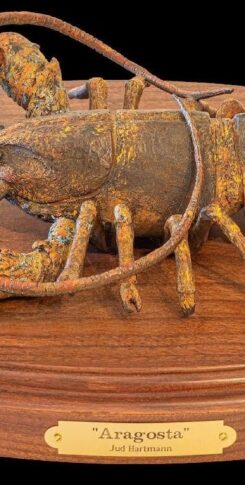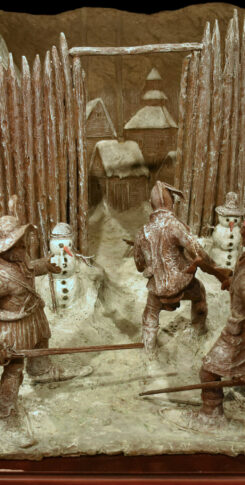
Bronze edition: 10 | Height: 20″
“We consider ourselves much happier than you in that we are very content with the little we have … and while feeling compassion for you … we wonder at the anxieties and cares which you give yourselves night and day in order to acquire material possessions … now tell me this, if thou hast any sense, which of these two is the wisest and happiest? : he who labors without ceasing and only obtains with great trouble enough to live on, or he who rests in comfort and finds all that he needs in the pleasure of fishing and the hunt? … learn now my brother, once and for all, because I must open my heart to thee: there is not one Indian who does not consider himself infinitely more happy, freer and more powerful than (you).”
Micmac Chief (1676)
“The world hath no better marksmen with their bows and arrows than they be.”
Alexander Whitaker (1613)
“I suppose the world hath no better marksmen with their bows and arrows than they be.”
Alexander Whitaker (1613)
“Our young men are disposed to live like savages, frequent their company and be forever unruly and lawless like them. I cannot tell you monsieur how attractive this Indian life is to our youth. It consists of doing nothing, caring for nothing, following every inclination and getting out of the way of all correction.”
Canadian Governor LaBarre (1683) “But what also helps them to keep in health is the harmony that prevails among them. They have no lawsuits and take little pains to acquire the goods of this life, for which we Christians torment ourselves so much, and for our excessive and insatiable greed in acquiring them, we are justly and with reason reproved by their quiet life and tranquil disposition.”
Gabriel Sagard (1632)
“They appear to be fulfilling the scriptures beyond those who profess to believe them. In that of taking no thought of tomorrow and also in living in love and peace and friendship together without disputes. In this respect they shame those who profess Christianity.”
Col. James Smith (1799)
“Perhaps we should admire in them that moderation which has learned how to content itself with little, making them laugh … at the thought that (we) …. undertake works destined to last centuries (yet leave ourselves) no time to live.”
J. F. LaFitau (1724)
“Not he who has little, but he who wants more is poor.”
Seneca (4BC-65AD)
“All my possessions for a moment of time.”
Queen Elizabeth I, with her dying breath (1603)




